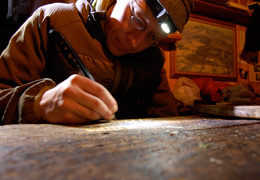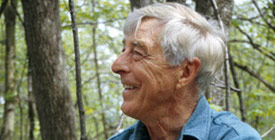The Writing Program
The Portfolio
Over the course of four semesters, Field Naturalists and Ecological Planners produce a spectrum of writing that serves them in the field, in the classroom, in their own academic reflections, and in their professions. We call it The Portfolio. Its 12 elements include:
- Journaling/Field Journaling
- Free Writing/Critical Reflection
- Grant/Fellowship Writing
- Site Reviews
- Project Proposals
- Professional Reports/Project Deliverables
- Technical/Scientific Paper Authorship
- Web Content/Blogging/New Media
- Newsletter Writing, Editing and Production
- News Releases and Media Campaigns
- Persuasive Writing
- Popular Non-Fiction: Journalism, Features and Essays
 No scientist succeeds without the force of the written word. For a Field Naturalist or Ecological Planner, writing is a tool no less vital than a map or hand lens. In our Writing Program, we bring observations and ideas from field to page. Our foundation is "The Portfolio" – a suite of writing each student completes before graduation. Students generate The Portfolio from graduate coursework and related writing instruction and assignments over the course of four semesters.
No scientist succeeds without the force of the written word. For a Field Naturalist or Ecological Planner, writing is a tool no less vital than a map or hand lens. In our Writing Program, we bring observations and ideas from field to page. Our foundation is "The Portfolio" – a suite of writing each student completes before graduation. Students generate The Portfolio from graduate coursework and related writing instruction and assignments over the course of four semesters.
Our writing curriculum begins with the essentials for descriptive, intelligent, persuasive writing. These include: exuberance for the subject, discovering detail outside, discipline at the keyboard, effective language and grammar, wisdom beyond the obvious and the courage to break a few rules now and then. In our writing seminars, students read, write, discuss and edit great and lousy prose.
Beyond the essentials, the curriculum travels a determined path of professional writing – communications skills that help students wins grants, for example, or move the public to act. We write about bedrock geology and Blue-gray Gnatcatchers. We write news releases, literature reviews, opinion essays and feature-length non-fiction. We write to understand, think, inform, persuade, celebrate. And we write to succeed.
The Hubert "Hub" Vogelmann Fund
 Writers change the world. Few people in our programs know that better than our founder, Professor Emeritus Hubert "Hub" Vogelmann. So essential is writing to Dr. Vogelmann's vision for the Field Naturalist and Ecological Planning programs that the University of Vermont recently established the Hubert "Hub" Vogelmann Fund for environmental writing and communications.
Writers change the world. Few people in our programs know that better than our founder, Professor Emeritus Hubert "Hub" Vogelmann. So essential is writing to Dr. Vogelmann's vision for the Field Naturalist and Ecological Planning programs that the University of Vermont recently established the Hubert "Hub" Vogelmann Fund for environmental writing and communications.
Dr. Vogelmann's exemplary life and 36-year tenure on the UVM faculty have offered profound benefits for the people and landscape of Vermont. His achievements include pioneering research on acid rain and forest health. Never a cloisered academic, Hub has been passionate about science in the public interest and bringing intelligent discussion to the public square.
Hub's emphasis on writing means that our field naturalists launch their carreers with practical, effective communications skills. Over the last decade, for example, our graduates have produced 16 books, two of which have won national awards. With a curriculum grounded in science and problem-solving, writing is a potent and lively force throughout our coursework.
Your contributions to the Fund will support Field Naturalist Program operations, particularly our innovative writing curriculum, which features a work in dozen writing genres, workshops and one-on-one instruction from our writing faculty. One expression of the writing program is Field Notes, our annual proceedings written and edited by students.
To support the Fund and its goals, visit The University of Vermont Foundation, where you can make a pledge online or get information to give by telephone. If you have questions about the Fund contact the Field Naturalist Program Director, Dr. Jeffrey Hughes, at Jeffrey.Hughes@uvm.edu or 802-656-0708. Thanks!
 No scientist succeeds without the force of the written word. For a Field Naturalist or Ecological Planner, writing is a tool no less vital than a map or hand lens. In our Writing Program, we bring observations and ideas from field to page. Our foundation is "The Portfolio" – a suite of writing each student completes before graduation. Students generate The Portfolio from graduate coursework and related writing instruction and assignments over the course of four semesters.
No scientist succeeds without the force of the written word. For a Field Naturalist or Ecological Planner, writing is a tool no less vital than a map or hand lens. In our Writing Program, we bring observations and ideas from field to page. Our foundation is "The Portfolio" – a suite of writing each student completes before graduation. Students generate The Portfolio from graduate coursework and related writing instruction and assignments over the course of four semesters. Writers change the world. Few people in our programs know that better than our founder, Professor Emeritus Hubert "Hub" Vogelmann. So essential is writing to Dr. Vogelmann's vision for the Field Naturalist and Ecological Planning programs that the University of Vermont recently established the Hubert "Hub" Vogelmann Fund for environmental writing and communications.
Writers change the world. Few people in our programs know that better than our founder, Professor Emeritus Hubert "Hub" Vogelmann. So essential is writing to Dr. Vogelmann's vision for the Field Naturalist and Ecological Planning programs that the University of Vermont recently established the Hubert "Hub" Vogelmann Fund for environmental writing and communications.